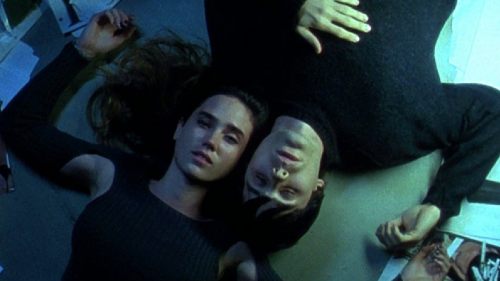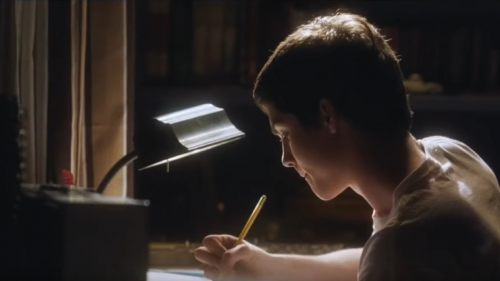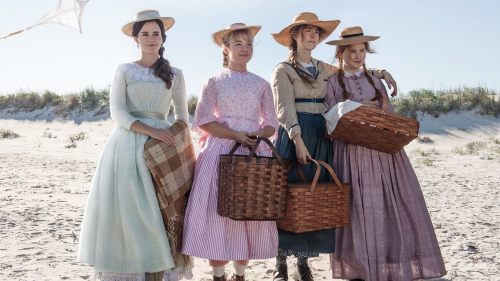NOAH Review: Swords, Angels And Complex Moral Questions
There has never been a Bible movie like Darren Aronofsky’s Noah. This is a film that treats Biblical stories with the sort of sweeping fantasy filmmaking usually reserved for Greek myth, and it is filled with the kind of moral and theological debate that is usually kept to small budget festival movies, not FX-laden blockbusters. It’s strange and idiosyncratic, it’s profound and overblown. It is a film that sometimes stumbles over its own ambition, but the moments when it succeeds are absolutely sublime. I’m tempted to say that Noah - a fantasy epic that explicitly wrestles with nuanced questions of philosophy - is a movie made for nobody, but that would be a lie because it’s pretty much exactly a movie made for me.
There are two main premises into which you must buy for Noah to work. One is that the events of the Bible are true. The other is that the world before the Flood was extraordinarily different. Even the sky has an alien tinge in these early days of Genesis, a time when magic was real and angels clad in armor of stone killed all who trespassed on their land. The antediluvian Earth even looks different from space; the familiar continents have not yet formed and the face of the world is dominated by Pangea. This is Darren Aronofsky’s Middle Earth - an almost familiar place that is about to pass out of memory. But unlike the bittersweet loss evoked in JRR Tolkien’s writing, the loss of the antediluvian world (and its armor and swords and spells) is a cleansing.
As Noah opens the world is already post-apocalyptic. The children of Cain, banished from Eden and tainted by the first murder, have spread across the supercontinent and created vast industrial civilizations. They’ve laid waste to the environment and now their cities wither and die. Mad Max types wander the wastelands, killing all before them. Noah - a descendant of Seth, Cain’s other brother - lives a righteous life away from men. He and his family live off the land, taking only what they need to survive. They don’t eat animals. They try to tend the world left for them by the Creator.
But the Creator isn’t happy, and he comes to Noah in a dream and gives him visions of what’s to come. A flood will destroy the world, cleansing it. Noah understands his task to be keeping safe breeding pairs of all the animals in the world so that when the waters recede they can repopulate the Earth. But as time goes on Noah, getting his instructions only through dreams, begins to believe that the Creator’s ultimate goal is to eliminate all men, leaving only the animals. Noah reasons that his family will be the last survivors, and that when his youngest son dies, so ends the reign of humans.
That doesn’t sit well with the humans. As Noah builds his ark - aided by giant fallen angels encased in the muck of the world - an army of desperate people gathers. Led by Tubal-Cain they defy the desires of the Creator. They are men, and they decide when they live and die, and they will not let God wash them off the face of the world.
You know what happens in the end, but it’s these things along the way that give Noah its extraordinary power and depth. Tubal-Cain stands before his people and delivers a speech about how men, united, cannot be defeated. It’s a speech that Aragorn might give in Lord of the Rings that would have the audience on its feet; in Noah it’s the words of the villain.
Or is he the villain? Noah is so complicated morally that everything the ostensible villain says is not just relatable, it’s hugely defensible. In fact the script has to have Tubal-Cain threaten to take the women in Noah’s family in order to paint him in a truly evil light. That’s not because what Tubal-Cain has done is grey, but rather because the film’s titular moral center has done things equally as indefensible. And don’t get me started on what God is doing. Noah doesn’t shy away from the enormity of the Flood - a sequence has people screaming and clinging on to a mountain peak as the waters smash them away, their death cries echoing within the expanse of the ark. This isn’t the version of the Flood as seen in cheery Sunday School books. It’s one of the most harrowing things I have ever seen in a PG-13 movie.
By the time that happens Noah has smartly, subtly pulled the rug out from under us. The man we were following has morphed into an antagonist. Motivated by his zealotry and interpretation of God’s vague demands, Noah is on a grim death trip. Noah has a unique structure that doesn’t quite fit into the three act mold, and this is the part of the movie where it feels like we’ve entered the sequel to the first half of the film. The pre-Flood movie climaxes in a massive battle where the stone Watchers melee with ragged humans, smashing them with tree trunks and crushing them into the mud; Aronofsky films this with the kind of gliding CGI camerawork you expect to find in a fantasy movie where an army of evil orcs is pitted against a bastion of good, but as you watch the sequence something doesn’t quite sit right. After all, the evil orcs are... secular humanists. The growing unease is put into words by Noah’s son Shem - not everyone who is dying can be a soldier. How can everyone on Earth be wicked? How can they ALL be deserving of this death? Noah, as servant of the God who engineered this slaughter, is complicit - and the film goes to great lengths to show us this, even having Noah leave a young girl to be trampled to death by a mob.
Like I said, the movie walks right into complicated moral areas rarely - if ever - explored by big budget blockbusters. But don’t think that this complicated morality is all in service of a simplistic “God is a jerk,” message, even if Aronofsky is an avowed non-believer. His approach to all of it is complex, even God’s part in the whole mess. There are no easy answers in Noah, and as the film goes on it’s revealed that this is the true theme of it all - how can you be a man of conviction and conscience in a world where nothing is black and white, where evil has a good argument and the good guys are behaving in ways that make them indistinguishable from the bad guys? In a complicated world is any hard line belief even possible?
Aronofsky’s script (co-written with Ari Handel) doesn’t approach these topics subtly (and in fairness subtlety has never been a concern of Aronofsky), and without the towering presence of Russell Crowe as the Biblical patriarch I don’t know that it would have worked. Noah, being quite self-serious, often veers into silly territory, and some of the film’s performances are problematically overblown (Jennifer Connelly has a big moment that simply isn’t modulated properly, even considering it comes after all life on Earth has been exterminated by a flood), but Crowe - who in recent films has been given to a certain non-Kosher hamminess - is incredible. His Noah is a man of quiet principle whose descent into zealotry is sketched so finely that when he’s stalking around the ark glowering like a murderer you feel weird for still empathizing with him. Crowe understands the bombastic tone for which Aronofsky is striving, and he plays right below it, his face a cloud of troubles that reflects the superstorms that swallow the world later in the film. He knows that the movie itself is BIG, so he plays Noah’s struggles internally. It’s the kind of performance that reminds you why this phone-throwing bar band leader was once considered one of our finest actors: because he is.
The other two strongest performances come from Logan Lerman as Ham, the callow son caught between the bad warrior father figure of Tubal-Cain (Ray Winstone in a perfectly broad performance) and Noah, and from Emma Watson as Ila, wife of Noah’s son Shem. Much of the film’s moral weight is placed on these two - Ham’s eventual decisions about his paternal figures seem to speak to Aronofsky’s personal feelings, and Ila is given the task of contextualizing it all in the end - and they’re mostly able to carry it. Lerman especially is a revelation, playing Ham with a brooding intensity that is appropriately childish. His role is strange, not least because Aronofsky, while making the antediluvian world a fantasy one, has kept the Old Testament’s weird and harsh morality, and so Ham whines about not being able to procure a wife before all the women die. Not woo a wife, but rather not being offered one by God (or Noah, who goes to the human camp to check for possible mates for his kids).
If Lerman’s performance is uniformly excellent Watson is slightly more problematic. When she’s good - scenes where she’s defiant and angry with Noah, or where she is wrestling with a personal despair that’s profound - she’s great. But there are other moments where she’s gratingly unnatural, especially lots of scenes where she has a fake pregnancy belly and keeps doing an oh-so actorly grasping of it. It’s frustrating because her good moments are so strong.
I fear that all of this talk about moral complexity and theological implications of belief are ignoring the fact that Darren Aronofsky has made a compelling and weird fantasy epic. Having seen the film twice now I can say that while it takes a moment to get used to the aesthetic he’s using - we’ve simply never seen Biblical-era stories presented this way - once you are in the world it’s as cohesive and exciting as any other fantasy world presented onscreen. Aronofsky’s antediluvian world has subtle magic and strange creatures, and while there are often costumes and designs that recall Lord of the Rings or other epic fantasy stories, his setting is largely unique.
Noah gives Aronofsky a chance to tell the entire story of creation, and he does it using a quick-cutting montage style that ends up looking like a hybrid of stop motion and time lapse. It’s exciting and gorgeous, one of the best such sequences in a career stuffed with mind-blowing montage, and Aronfsky attempts to harmonize the six days of Creation with our understanding of cosmology and evolution; science and faith co-exist in his Genesis. He offers us glimpses of the Garden of Eden and he comes back again and again to Cain killing Abel, including one brilliant montage where all of humanity’s murderous impulses throughout history are replayed in that one foundational murder. The Original Sin of the Bible is eating the fruit of the Tree of Knowledge of Good and Evil, but for Aronofsky the truly troubling moment is when brother killed brother. That’s vital, because while much of the movie plays as an eco-fable where progress is bad for the world, the film eventually moderates that opinion. The true problem isn’t that man attained knowledge (and thus industry), it’s that man has been bad to himself and all around him.
The fantasy stuff allows Aronofsky free reign to flex his filmmaking muscles. Always a proponent of the practical, CGI gives him more options, and while the trailers had me worried that Noah would be a pixelfuck, the finished product works. There is a lot of CGI, but it’s integrated into a hyper-realistic aesthetic where it feels correct. The Watchers, rumbling about in stone form, have a stop motion look to them, and the Flood itself - geysers spout from the ground as torrential rains beat down - is so surreal in scope that the CG is appropriate. What’s more, Aronofsky uses all of this CG in service not just of action - and there’s a pretty thrilling battle scene about two-thirds of the way through the movie where CG men get creamed by CG Watchers - but in service of his larger thematic concerns. The only FX stuff that left me cold ended up being the processions of animals to the ark; I found the overly-choreographed movements of the rendered beasts distracting.
But CGI in general becomes a mighty weapon in Aronofsky’s arsenal, and Noah as a result is filled with strong, vital visual filmmaking. Another weapon in the arsenal is Clint Mansell’s score, brimming with driving, steely bombast. At some points it sounds like Mansell is quoting his own work from The Fountain, which I believe is perfect - the two films have similar spiritual preoccupations and both movies happily wear their hearts on their sleeves.
The last Bible movie that struck me like Noah is The Last Temptation of Christ. They’re vastly different films in scope and aesthetic, but both films use religious text as a way to explore larger issues that are both personal and spiritual. Any believer must walk away from Noah satisfied that it has presented the tribulations and uncertainties of faith in ways that are fair and, in the end, inspirational. Non-believers will also find incredibly complex philosophical issues to take home, the kinds of questions that have occupied the greatest minds in human history.
When I say that Noah is weird I don’t necessarily mean that it’s filled with strange story elements or magical moments (although it has both). I mean that it’s a movie that thinks it’s totally normal to insert big ideas into a blockbuster, that believes a PG-13 movie can have its protagonist be so complicated that he becomes the antagonist, that it’s a movie that tackles the silliest, most unbelievable tale in Genesis without a trace of irony or even disrespect. This is an audacious film, made by one of the bravest, most visionary filmmakers of his generation. Some of you will step over the film’s flaws - byproducts of its ambition - and find an exciting fantasy epic that demands you turn your brain all the way on. Some of you will find it all too much, too weird and too silly. I get that. Noah is defiant of the blockbuster model in many ways, not the least being that this is not a film for everyone, it's not a four quadrant middle of the road blandfest. This is a personal movie writ large, a movie that challenges itself and its audience. It’s very much a Darren Aronofsky movie, and that in itself is kind of a miracle.



